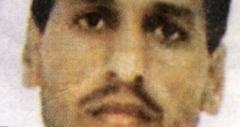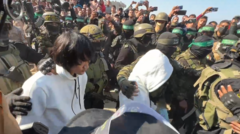Hamas has confirmed the death of Mohammed Deif, marking the end of an era for its military wing amid ongoing conflicts in the region.
Hamas Struck by Leadership Loss: Military Chief Mohammed Deif Confirmed Dead

Hamas Struck by Leadership Loss: Military Chief Mohammed Deif Confirmed Dead
In a significant development, Hamas announces the death of its military chief, signaling repercussions for the group.
In a stark acknowledgment, Hamas has confirmed that its military chief, Mohammed Deif, has been killed. For months, there were conflicting reports about Deif's fate since Israel's military had claimed his death in an air strike back in July of last year—now, Hamas has verified this claim. According to Israeli sources, Deif was integral in orchestrating the horrific attacks on October 7 that resulted in the loss of approximately 1,200 lives, along with 251 individuals taken hostage.
Deif was recognized as a key figure in Hamas, often deemed the organization's second-in-command in the Gaza Strip, just behind Yahya Sinwar, who also fell victim to Israeli military actions last year. His prominence was underscored by an arrest warrant issued by the International Criminal Court (ICC), which also sought the apprehension of Israeli Prime Minister Benjamin Netanyahu and former defense minister Yoav Gallant.
Deif played a vital role in establishing tunnels that have enabled Hamas militants to infiltrate Israeli territory, and he was credited with developing the Qassam rocket, which became synonymous with the group’s arsenal. Hamas’ recent announcement also highlighted the death of Marwan Issa, the deputy military commander, a figure linked by the European Union to the deadly October 7 assault and long considered one of Israel's most wanted individuals.
The ongoing conflict saw its most violent escalation following the October 7 attacks, prompting a systemic Israeli military response that, according to Gaza's official medical reports, has resulted in over 47,460 Palestinian fatalities in the Gaza Strip over the past 15 months. Despite the chaos, a ceasefire was established on January 19, leading to the release of 15 hostages and around 400 Palestinian prisoners, including individuals serving lengthy sentences for severe offenses and youths detained without trial.
These recent events emphasize the precarious situation in the region, where the cascading effects of leadership losses could further influence the ongoing struggle between Hamas and Israeli forces.
Deif was recognized as a key figure in Hamas, often deemed the organization's second-in-command in the Gaza Strip, just behind Yahya Sinwar, who also fell victim to Israeli military actions last year. His prominence was underscored by an arrest warrant issued by the International Criminal Court (ICC), which also sought the apprehension of Israeli Prime Minister Benjamin Netanyahu and former defense minister Yoav Gallant.
Deif played a vital role in establishing tunnels that have enabled Hamas militants to infiltrate Israeli territory, and he was credited with developing the Qassam rocket, which became synonymous with the group’s arsenal. Hamas’ recent announcement also highlighted the death of Marwan Issa, the deputy military commander, a figure linked by the European Union to the deadly October 7 assault and long considered one of Israel's most wanted individuals.
The ongoing conflict saw its most violent escalation following the October 7 attacks, prompting a systemic Israeli military response that, according to Gaza's official medical reports, has resulted in over 47,460 Palestinian fatalities in the Gaza Strip over the past 15 months. Despite the chaos, a ceasefire was established on January 19, leading to the release of 15 hostages and around 400 Palestinian prisoners, including individuals serving lengthy sentences for severe offenses and youths detained without trial.
These recent events emphasize the precarious situation in the region, where the cascading effects of leadership losses could further influence the ongoing struggle between Hamas and Israeli forces.






















